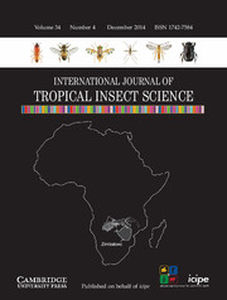Article contents
Effects of Azadirachta indica (Neem) Extract on Livestock Fleas in Morogoro District, Tanzania
Published online by Cambridge University Press: 19 September 2011
Abstract
Aqueous neem seed kernels extracts (NSKE) were used to treat flea-infested goats in Morogoro, Tanzania to determine their efficacy for flea control. Mean population densities of the insects were significantly lower in the treated goats compared to their untreated counterparts (P < 0.05). It was concluded that NSKE has potential in controlling livestock fleas, but further studies are needed to determine the active principals against fleas and their mode of action.
Résumé
Dans cette experiment on a determiné l'efficacité de ‘nim’ graine pour traiter les bétail contre des puces. Des extrait des graines était utilisé pour traiter des chevres infesté des puces. La moyenne de la densité de la population des insects était significant plus bas dans le group des expériment que dans le groupe témoin (P < 0.05). On a concludé que nim peut etre utilisé dans la controle de puces chéz les bétail, et qu' on peut considerer de l'incuder dans le programme IPM du contrôle des invasions, et que des experiment dans la future doivent déterminé les éléments active contre les puces.
Keywords
- Type
- Short Communication
- Information
- Copyright
- Copyright © ICIPE 2001
References
REFERENCES
- 2
- Cited by


